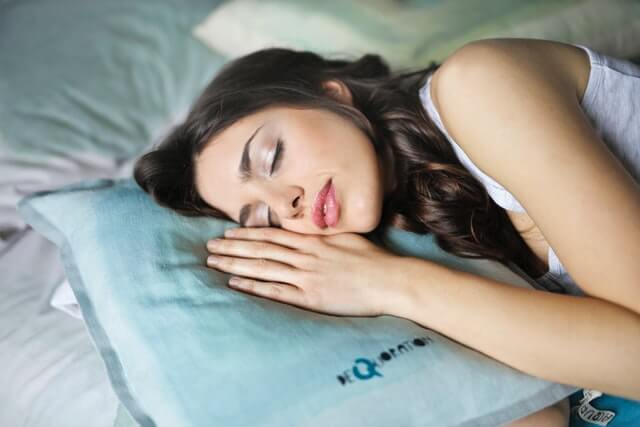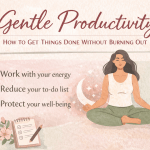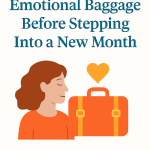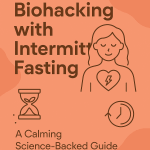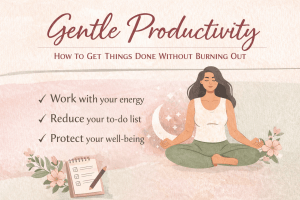Here’s a funny insomnia story. George was pacing back and forth in his room in the middle of the night, unable to sleep. His wife woke up and inquired as to why he was so upset. George responded that he owed Bob, his neighbor, $1000 that it was due tomorrow, and that he was worried because he didn’t have it.
His wife yelled ‘Bob’ as she opened the window. A light turned on next door, and Bob peered out the window. She went on, “I know my husband owes you $1,000, but he doesn’t have it.” Then she shut the window and turned to face her husband, saying, “Now let him pace the floor while you sleep.”
Jokes apart, a poor night’s sleep causes a lack of alertness, excessive daytime sleepiness, impaired memory, stress, and a sluggish feeling throughout the day.
To enjoy a peaceful slumber here are a few home remedies for insomnia that are easy to use and follow. We also describe some products that will help you enjoy a good night’s sleep.
Home Remedies for Insomnia
#1. Mindfulness Meditation
Research suggests that various types of meditation could help improve insomnia and enhance sleep quality, ––––particularly mindful meditation appears to improve the quality of sleep and reduce daytime sleepiness in older people and people with chronic insomnia.
So what is mindful meditation?
Mindfulness can help quiet the brain and prepare it for a deeper sleep. Shelby Harris, a clinical sleep psychologist, writes on mindful.org that in her private practice, one of the most common issues her clients have is dreading the night as it approaches and being apprehensive about attempting to fall asleep.
Mindfulness can help you sleep better by making you more aware of your thoughts and allowing you to let go of fears rather than becoming caught on them.
Experts advise that strengthening your mental muscles through daily practice helps you recognize the negative insomnia-inducing thoughts and let them pass. Likewise, scientific studies say that mindfulness may have a similar effect as other highly recommended insomnia treatments.
Mindfulness do’s and don’ts for a good night’s sleep
- Meditate daily
- Practice mindfulness for at least 20 minutes before you go to sleep
- Don’t rely on any sleeping apps
- Try not to force your sleep
- Eliminate distractions, and do not use your phone or tablet before sleeping
Simple tips to calm a worried mind
- Encourage positive distractions
- Practice nightly mindfulness
- Focus on gratitude
- Keep your phone alarm to a more relaxing music
- Hydrate before you caffeinate
- Start your day by enjoying the nature around you instead of staring at your phone or laptop.
#2. Yoga
Yoga is a meditation practice that combines focus, breathing, and attentiveness with physical exercise. It benefits people of all age groups, from children to the elderly. A national survey found that 55% of people who did yoga said it helped them get better sleep, and over 85% said yoga helped reduce stress.
Even occasionally, practicing yoga will improve sleep quality more than no practice. If you aim to use yoga to enhance sleep, consider making a schedule where you practice it regularly. For instance, it may be attending weekly classes or designating a specific time of day to practice at home, or combining both.
How yoga enhances sleep quality
Yoga helps you sleep peacefully, increases breathing awareness, and supports weight loss. Also, it increases melatonin levels and reduces sleep disturbances in adults.
Here are seven restorative yoga poses that relieve tension and stress at the end of the day and give you a good night’s rest.
- Comprehensive knee child’s pose
- Standing forward bend
- Standing half-forward bend
- Recycling bound angle pose
- Legs up the wall pose
- Corpse pose
- Legs on a chair pose
#3. Exercise
Exercise results in a good night’s sleep and benefits your body and mind. Experts say that they have solid evidence that exercise helps you fall asleep more quickly and improve sleep quality.
Interestingly, moderate aerobic exercise increases the amount of slow-wave sleep we get. Slow-wave sleep refers to deep sleep where your mind and body get a chance to rejuvenate. Likewise, slow-wave sleep helps stabilize your mood and destress your mind, a process essential for naturally transitioning to sleep.
The best time to exercise
Exercising close to bedtime at night is the best time to exercise to get a good night’s sleep. Aerobic exercises help the body release endorphins. These chemicals create a lot of activity in the brain, and they help keep people awake, so it is good to exercise at least one to two hours before going to bed, giving your brain time to wind down.
Likewise, exercise raises the core body temperature. Elevation in the core body temperature signals the body clock that it’s just time to be awake. After 30 to 90 minutes, the core body temperature starts to fall. The decrease in body temperature helps to facilitate sleepiness.
Types of exercises promote a better and higher quality of sleep than others.
Aerobic exercise
Studies show us that regular aerobic exercise for an extended period can improve sleep quality and reduce excessive daytime sleepiness for people who have insomnia. Likewise, moderate-intensity aerobic activities decrease the severity of sleep-disordered breathing conditions like obstructive sleep apnea. Interestingly, some studies say that moderate-intensity aerobic exercises may significantly improve sleep quality than vigorous-intensity exercises.
Resistance training
Resistance exercise, also known as strength training, aims to increase muscle strength all over the body. Examples of resistance exercises include lifting weights, push-ups, sit-ups, and other resistance exercises using resistance bands.
Regular resistance exercises help to improve sleep quality. They also decrease or lower your risk of anxiety and depression, the two common risk factors for sleep disorders like insomnia.
#4. Massage
A nice warm massage flushes out your pain, gives relaxation, and promotes sound sleep. Likewise, massage promotes sleep by decreasing cortisol levels, a stress hormone, and increasing dopamine and serotonin, the neurotransmitters that help stabilize mood.
Pain and sleep loss can aggravate each other. A lack of sleep can exacerbate pain, while pain can make it challenging to find a comfortable position to sleep in.
Eventually, giving an excellent massage improves blood flow and promotes sound sleep. Massage therapy helps manage various types of pain, including neck and back pain, arthritis, headache, and pain after surgery.
Research improves sleep in people with secondary insomnia related to menopause, cancer, caregiving cancer, congestive heart failure, and other conditions.
Here are some examples of massage methods
Swedish massage
Sports massage
Deep tissue massage
Trigger point therapy
#5. Magnesium
Magnesium is a nutrient involved in several bodily functions. It plays a role in muscle and nerve function, regulates blood pressure and blood sugar, and even helps build bones and DNA.
Experts say that magnesium may help regulate neurotransmitters that are related to sleep. Neurotransmitters are chemicals that transmit messages between nerve cells in the brain and body.
According to research, magnesium may help alleviate the symptoms of insomnia.
A study of elderly patients with insomnia found that taking 500 mg of magnesium daily for eight weeks enhanced their sleep quality and reduced early morning awakenings. Likewise, it increased the concentration of melatonin, a sleep hormone that plays a role in regulating blood pressure, and decreased the concentration of cortisol, the stress hormone.
Usually, magnesium supplements are safe, but they could sometimes interfere with some medication, so seek your doctor’s advice before adding them to your routine.
Instead of using magnesium supplements, focus on getting the proper nutrients in the diet. The American dietary guidelines say that you should meet most of your nutritional needs by consuming nutrient-dense foods, including vegetables, fruits, grains, whole grains, dairy, and protein foods.
Some foods rich in magnesium include the following
- Leafy green vegetables
- Yogurt
- Milk
- Nuts
- Legumes
- Seeds including almonds, cashews, peas, and beans
- Soya milk, tofu, and other soya products
- Whole grains like brown rice
#6. Lavender oil
The mellow, floral scent of lavender not only pleases your senses but also helps you to have an instantly calming effect. Lavender is an evergreen plant native to North Africa and the Mediterranean region. This gently scented flowering herb helps relieve anxiety, acts as a sedative to increase relaxation, and enhances sleep.
Also, lavender interacts with the neurotransmitter GABA to soothe the brain and nervous system activity reducing anger, restlessness, and anxiety. It functions as a pain reliever, reduces inflammation, and has antibacterial capabilities.
Studies show that using lavender oil for aromatherapy can improve sleep quality in people with depression, insomnia, and anxiety.
Aromatherapy using lavender oil may also increase deep slow-wave sleep. Researchers found that coronary heart disease sufferers and middle-aged women complaining of insomnia improve their sleep quality when using lavender.
How to use lavender oil for a good night’s sleep
- Sprinkle a few drops of lavender oil and inhale directly.
- Likewise, you can put a few drops of lavender oil on your pillow or add some drops to an aromatherapy diffuser or vaporizer. Never apply concentrated lavender oil directly to your skin as it may cause skin irritation.
#7. Good sleep hygiene
Having good sleep hygiene means putting yourself in the best possible position to sleep well. A consistent sleep schedule, pre-bed routine, and daily routine make quality sleep feel more automatic. Likewise, creating a pleasant bedroom environment helps you to dose off quickly.
Tips for good sleep hygiene
- Have a fixed wake-up time
- Prioritize your sleep
- Keep your routine consistent
- Listen to calm music and do light stretches or relaxation exercises for 30 minutes before you go to sleep
- Dim your lights
- Unplug from electronics
- Practice meditation
- Get your daily daylight exposure
- Be physically active
- Reduce alcohol consumption
- Cut down caffeine consumption in the afternoon and evening
- Use a comfortable mattress and pillow
- Keep the room temperature cool yet comfortable
- Block out light
- Reduce noise
- Try calming scents such as lavender to induce sleep
#8. Progressive muscle relaxation
Progressive muscle relaxation is the deep relaxation technique that effectively controls stress and anxiety, relieves insomnia, and reduces symptoms of certain types of chronic pain.
It’s usually practiced by tightening one muscle group, then a relaxed phase, and slowly releasing the tension.
Studies show that the progressive relaxation technique effectively reduces anxiety, high blood pressure headaches, and digestive issues like irritable bowel syndrome.
Some people may even fall asleep before they finish their progressive muscle relaxation exercises. According to a recent research study on people with anxiety disorders, an eight-week progressive muscle relaxation program significantly reduced anxiety, stress, and depression symptoms while improving the health-related quality of life and well-being.
Muscle relaxation works because your body naturally moves from an alert to a resting state when your muscles are relaxed. Moreover, combining progressive muscle relaxation with diaphragmatic breathing helps you relax and sleep better.
Here are the steps
- Scrunch up the muscles of your toes and feet as tightly as possible
- Hold up this position for four to ten seconds while inhaling.
- Exhale and breathe slowly for another 10 to 20 seconds and slowly release the tension.
- Repeat the step for the rest of the muscle groups for the thighs, the back, butt, shoulders, biceps, forearms, chest, and neck, around the eyes, and jaws.
As you move through the muscle groups, you may notice an area of the body that holds extra tension. Increase your squeezing time by about a few seconds more, and then release it so that part of the body can relax. Just concentrate on doing progressive muscle relaxation and resist any urge to check your phone or do anything else.
Insomnia during pregnancy
Getting quality sleep is essential during pregnancy for both the mother and baby. Sleep also plays a significant role in learning, appetite, memory, mood, and decision-making.
Chronic sleep deprivation takes a stroll on the immune system. Likewise, poor sleep during pregnancy is also linked to gestational diabetes mellitus.
Severe sleep deprivation in early pregnancy may raise the risk of preeclampsia, leading to preterm delivery and complications for the mother’s heart, kidney, and other organs. Also, not getting enough sleep during pregnancy can raise the risk of high blood pressure in the third trimester.
There may be many causes of insomnia during pregnancy, including the need to urinate frequently, nausea, back pain, abdominal discomfort, leg cramps, shortness of breath, breast tenderness, heartburn, and vivid dreams.
Some ways to get good sleep during pregnancy
- Develop a bedtime routine
- Avoid screen time at least half an hour before bed.
- Take a soothing bath.
- Eat healthy foods
- Hydrate yourself throughout the day but minimize drinking after 7 p.m.
- Try to avoid caffeine starting in the late afternoon.
- Eat a healthy dinner but try to enjoy it slowly to reduce the chances of heartburn.
- Try to eat an early dinner.
- A warm glass of milk can also help you feel sleepy.
- Stay active during the day.
- Please make yourself at ease by lying on your side with a pillow between your knees and using one pillow under your belly as it gets bigger.
- Use a comfortable sleeping bra.
- Keep your room dark, calm, and quiet for optimal sleeping conditions.
- Relax by practicing meditation
Products that will help you enjoy a good night’s sleep.
Go2 Sleep device
It is an advanced sleep tracker with heart rate and blood oxygen monitoring functions. Go2 provides sleep feedback to understand and optimize your sleep. Also, it’s easy to use, soft and comfortable, and records data in seconds during sleep.
Sleep eye mask
The sleep eye mask is truly a spa for your eyes. It helps relieve tired and stressed eyes with the help of warm and relaxing steam. The sleep eye mask is convenient and safe. Just open the pack, flip over, close your eyes and back, and keep your eyes shut for 20 minutes before removing it.
Blue light-blocking glasses
These glasses block blue light because the high-energy blue light causes dry eyes and directly influences sleep quality.
Latex mattress
Latex mattresses made with 100% pure latex offer both support and pressure and benefit all types of sleepers’.–––backside and stomach.
These mattresses conform to the body by gently curving in heavy areas like the hips and shoulders and offer support to reduce pain-causing pressure points. The high elasticity of latex also supports the neck and back and keeps the spine’s natural alignment. These mattresses are organic, eco-friendly, breathable, and durable.
Chili sleep
Chile sleep provides cooler temperatures to soothe your brain to fall asleep faster, improve muscle recovery, increase deep REM sleep, and wake up feeling rested
Napify sleep tape
Clinical studies say that nasal breathing offers excellent benefits, including increased blood circulation, immunity, and healthier digestion. Napify sleep tape gently increases nasal breathing and enhances sleep quality.

